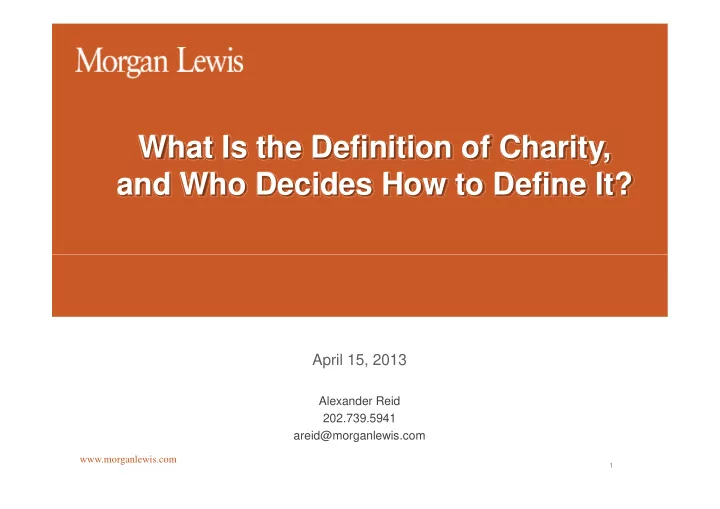

What Is the Definition of Charity, and Who Decides How to Define It? April 15, 2013 Alexander Reid 202.739.5941 areid@morganlewis.com www.morganlewis.com 1
1. Charity Is Civil Society
Every Charity Begins with a Gift Through Gifts We Create, Fund, and Operate the Organizations of American Civil Society
Civil Society Is One of the Foundations of American Civilization Civil Government Business Society Family
It Is About Self Reliance
It Is About Variety
It Is About Public Benefit We all benefit from civil society. • Educational organizations provide businesses with an educated work force and democracy with an educated electorate. • Religious, ethnic, and cultural organizations • Religious, ethnic, and cultural organizations knit together communities with a common identity • Charitable organizations help all of us when disaster strikes • Volunteer organizations give us a sense of purpose
It Is About Democracy Civil Society Does Not Require Sovereign Permission
A Delicate Balance Democracy Civic Civic Government Government Engagement ? Civil Society Subsidy or Neutrality?
2. The State and Civil Society
The Charitable Deduction Removes Charitable Gifts from the Tax Base The Charitable Tax Exemption Removes Income Related to Charitable Purposes From the Tax Base
The Tax Law Forms a Boundary Between the State and Civil Society
Which Allows the Government to Tax… WWII 100.00% 94.00% 90.00% WWI Historic US 77.00% 80.00% Income Tax Rates 70.00% 63.00% 60.00% New deal 50.00% 50.00% 39.60% 40.00% 30.00% 28.00% 20.00% Tax Reform 24.00% Great Depression 10.00% 0.00% 1913 1917 1921 1925 1929 1933 1937 1941 1945 1949 1953 1957 1961 1965 1969 1973 1977 1981 1985 1989 1993 1997 2001 2005 2009 2013
…Without Consuming Civil Society
It Enables Civil Society to Fund Itself, Which Prevents Government Control
It Restricts the Fiscal Relationship Between Church and State
3. Why Our Discourse About the Charitable Deduction Needs a Paradigm Shift
As Specialists We Think About the Charitable Deduction Too Narrowly
The Tax Lawyer It lowers the after-tax cost of giving!
The Economist It creates an incentive to give!
It Is Time For a New Paradigm: Neutrality “Incentive” and “Subsidy” Are Inadequate to the Task
Subsidy Is Inconsistent with Freedom (1) Government may restrict how government funds are used + (2) The recipient of a subsidy uses government funds government funds + + (3) If the charitable deduction is a subsidy of civil society… = Then the government may restrict the activities of civil society
Just as a gift to charity is not a gift to the government that it may control Dartmouth College v. Woodward , 17 U.S. 519 (1819)
…a gift to charity is not a gift from the government that it may control The Subsidy Paradigm Makes Charitable Gifts a Trojan Horse
The Government Is Under No Obligation to Continue a Subsidy
4. Who Defines Charity?
Civil Society Is Self-Defining Americans Are Free to Identify and Pursue New Public Benefit Activities • Addressing new social problems like the digital divide • Combating new diseases like HIV or autism • Practicing new religions like Christian Science or • Practicing new religions like Christian Science or Jehovah's Witnesses Or Cease Activities That Are Obsolete, Unhelpful or Unfashionable • Sanitoriums for tuberculosis patients no longer needed • Hook worm has been eradicated • Phrenology and social Darwinism are debunked
Economics Defines Public Benefit, Not Government Economic Consumption Change in Net Worth Income Payments for Public Benefit Are Not Income Consumption Is a Measure of Private Benefit
Tax Law Requires Public Benefit and Screens Out Private Benefit To qualify, a 501(c)(3)… (1) Is organized and operated for a public benefit (2) Serves a broad and indeterminate class of beneficiaries (3) Does not distribute profits (3) Does not distribute profits (4) Does not engage in excessive lobbying or political campaign intervention (5) Does not violate public policy …and it must avoid self-dealing or excess benefit transactions
Donors Also Must Provide Public Benefit Without Excessive Private Benefit To qualify, under 170 a contribution must be… (1) Received by a domestic charitable organization (2) Used for a public benefit purpose (2) Used for a public benefit purpose (3) Reduced by the value of any goods or services the donor receives in exchange (4) Properly substantiated
A Self-Defining Civil Society Does Not Harm the Fisc Therefore, the Government Should Remain Neutral Toward Civil Society
Summary • Charity Is Civil Society • Civil Society Is Fundamental to American Civilization Civil Society Creates Public Benefits • Civil Society Does Not Harm the Fisc • Civil Society Is Self-Defining and the • Government Should Remain Neutral Toward It.
Recommend
More recommend